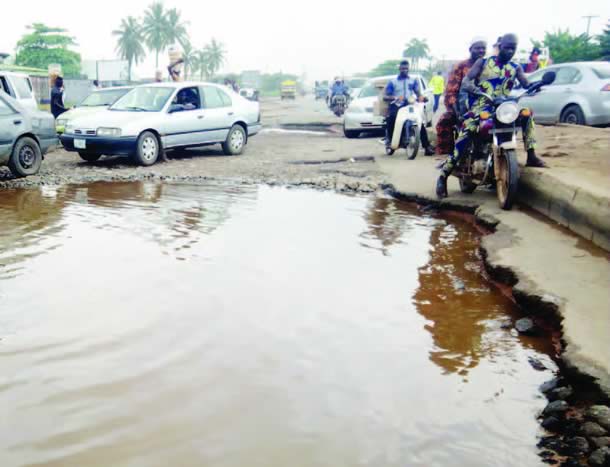A friend once said with a high level of conviction and I had every reason to believe it as true that one striking feature that marks a gulf of difference between developed societies, developing and the underdeveloped nations of the world is the priority placed on the state of their road network. Roads as key development infrastructure make a whole world of difference between cities that are planned and communities still awaiting centralized efforts at layout, planning and design initiatives. Some informed opinions have insisted that good motorable road is not just a critical signpost to development, it is a vital determinant of development itself with lots of multiplier effects. Roads are therefore the purveyors for the functional and practical realization of the set goals of the other sectors of the economy for the overall development of society. In addition to the excruciating cost of living which has put Nigerians on the edge, the high wave of insecurity and weak state of economy, poor and dilapidated state of road network remain another reason for the poor performance of the economy. So much controversy has been generated concerning whose responsibility it is to fix or maintain roads across the country. In Nigeria, Federal roads are constructed and maintained by the Federal Government through the Federal Ministry of Works and the Federal Roads Maintenance Agency. Roads are usually categorized as federal when they are connecting one State with another especially when their initial construction was done by the federal government. These roads currently measuring about 36,000km stretch, pass through States connecting other States but are duly considered the responsibility of the Federal government. Their repairs and maintenance remain statutorily the responsibility of the federal ministry of Works through the federal roads maintenance agency, FERMA. Budgetary provisions are therefore made annually, sometimes in trillions of Naira towards ensuring that this responsibility is carried out. However one major issue confronting Nigerians today is the failure of the Federal government in this regards resulting in the harrowing experiences by commuters and parts of the country being literally cut off from the rest.The road network in Nigeria can be classified into three : Trunk ‘A’ roads, Trunk ‘B’ roads and the minor roads . The trunk A roads are the ones constructed and maintained by the federal government. The point need to be clarified that federal highways are essentially designed for national connectivity and therefore are subject to federal standards and funding, while state highways cater to local and regional traffic needs, governed by state regulations and funding sources.
The Benin-Warri Expressway as well as Asaba- Benin highway are part of federal roads that have long turned death traps. , marred by potholes and deep gullies. Long distance travellers have since resolved to be diverting through towns and communities as a way of avoiding the dilapidated federal roads.Federal roads in Delta State critically begging for repairs cut across Effurun-Agbarho-Ughelli-Ughwerun-Patani-Bayelsa East West; Benin-Agbor-Asaba-Onitsha; Warri-Effurun-Sapele-Oghara-Benin; Sapele-Amukpe-Eku-Abraka-Obiaruku-Agbor; and the DSC-Aladja-Ovwian-Mofor-Effurun-NPA roads. A fortnight ago, a tanker laden with petrol fell at the Koko Junction, while trying to meander through the deplorable route with its content spilled on the road.
Meanwhile, the Benin-Warri Expressway which is less than 100-kilometre long, a strategic commercial route linking the two oil-bearing states with others and plied regularly by heavy-duty trucks currently almost impassable as the journey of less than one hour could drag on for the entire day. And the rains which have come in torrents this year have added to the nightmare of travelers. Because of the terrible state of the federal roads, many unscrupulous persons often lay siege, day and night, at the many failed portions to rob, maim, and abduct innocent travelers. Besides, the poor state of the roads hampers economic activities as agricultural produce cannot be transported easily to areas where they are needed. Incidentally, the Warri-Benin Expressway is part of the East-West Road connecting the states in the Niger Delta. Many cannot make sense out of a system which allows the Federal Government to be in Abuja and own roads in Delta State. Under an agreed system of repair and refund mechanism, every state government should be allowed to maintain the roads in their states as the current state of these roads are constituting major hindrance to development.
The failure of federal roads is a national tragedy that calls for the declaration of state of emergency.
Of the three federal roads linking Rivers and neighboring states, none is in good condition. The East-West Road, Owerri-Port Harcourt Road, and the Port Harcourt-Aba expressway harbor dangerous potholes and stretches of gullies.
Bayelsa and AkwaIbom do not have better tales to tell with respect to Federal government abandonment of its responsibility to maintain the trunk A roads. Good road network remains a critical prerequisite for the nation’s economy to bounce back on its feet. It is rather sad that not much is being heard from the federal minister of Works ,Dave Umahi, after his initial controversy about preference of concrete roads over asphalt. Whatever vision he may have conceived in Ebonyi may have, from all indications,been swallowed up by the FERMA cabals and the big time Abuja based road contractors. While all that is going on, Nigerians are daily agonizing on federal roads that have turned death traps providing cover to criminal elements even as the economy continues to bleed.


